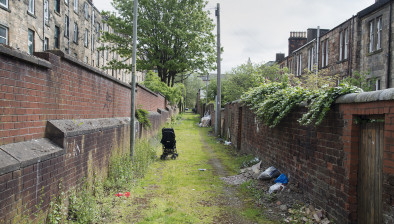England: No-fault eviction ban to be in place by summer

The UK Government hopes to introduce a ban on evicting tenants in England without a reason by next summer after its Renters’ Rights Bill was introduced to Parliament yesterday.
The legislation will ban Section 21 ‘no-fault’ evictions for new and existing tenancies, extend Awaab’s Law into the private rented sector and end blanket bans for those on benefits or with children.
Deputy prime minister, Angela Rayner said banning Section 21 alone will reassure tenants they can challenge bad practice without the fear of retaliatory eviction, as landlords will need to provide a valid cause to end a tenancy early. Going further, the Bill will abolish Section 21 evictions for both new and existing tenancies at the same time, giving all private renters immediate security and assurance.
Last year alone, nearly 26,000 households faced homelessness as a result of a Section 21 eviction and had to go to their council for support.
Standards will also be driven up, as the Decent Homes Standard will be applied to the private rented sector for the first time. Currently, 21% of privately rented homes are considered non-decent and more than 500,000 contain the most serious of hazards. Clear expectations will be set so tenants can expect safe, well-maintained, and secure living conditions.
Good landlords who provide these standards will benefit from clear regulation. This will eliminate unfair competition from those who, for far too long, have got away with renting out substandard properties to tenants.
Ms Rayner said: “Renters have been let down for too long and too many are stuck in disgraceful conditions, powerless to act because of the threat of a retaliatory eviction hanging over them.
“Most landlords act in a responsible way but a small number of unscrupulous ones are tarnishing the reputation of the whole sector by making the most of the housing crisis and forcing tenants into bidding wars.
“There can be no more dither and delay. We must overhaul renting and rebalance the relationship between tenant and landlord. This Bill will do just that and tenants can be reassured this Government will protect them.”
Other measures introduced in the Bill include:
- Applying Awaab’s Law to the private rented sector. This will ensure that all renters in England are empowered to challenge dangerous conditions.
- Apply a Decent Homes Standard to the private rented sector for the first time. Landlords who fail to address serious hazards can be fined up to £7,000 by local councils and may face prosecution for non-compliance.
- A ban on rental bidding wars, by cracking down on those who make the most of the housing crisis by forcing tenants to bid for their properties. Landlords and letting agents will be legally required to publish an asking rent for their property. They will also be banned from asking for, encouraging, or accepting any bids above this price.
- Ban on in-tenancy rent increases written in to contracts to prevent landlords implementing too high rents mid-tenancy, often to push out the current tenants. Under these reforms, landlords will only be allowed to raise the rent once a year, and to the market rate.
- Abolishing blanket bans on tenants with children or those in receipt of benefits to ensure fair access to housing for all.
A new Private Rented Sector Database will also be created to help landlords understand their obligations for compliance and provide tenants the information they need to make informed choices for new tenancies. It will also enable councils to focus enforcement where it is needed most.
Earlier this week, housing minister Matthew Pennycook met with landlord and tenant groups and committed to engaging with them as the Bill progresses, to ensure the sector is ready for the changes.
The Chartered Institute of Environmental Health (CIEH) has welcomed the publication but emphasised the importance of funding for enforcement.
CIEH is concerned about the large enforcement burden that the provisions of the Bill will impose on local authorities and the need for proportionate funding that is sustained and predictable.
The organisation said it supports, in principle, the proposal to apply a Decent Homes Standard to the private rented sector but believes that the various housing standards need to be consolidated to provide clarity for landlords, tenants and local authorities.
CIEH has also welcomed the proposal for a new private rented sector database and has called for the database to be used as a tool to support the use of licensing schemes by local authorities.
Mark Elliott, president of the Chartered Institute of Environmental Health, said: “This Bill is a step in the right direction but needs to be accompanied by better resourcing for local authority housing enforcement teams. Environmental health professionals have a crucial role to play in tackling poor housing conditions and thereby reducing ill health and saving lives.
“We have also urged the Government to use the Bill as an opportunity to make it easier for local authorities to use licensing schemes to improve housing standards.
“This could be done by enabling local authorities operating selective licensing schemes to use licence conditions to improve housing conditions, increasing the maximum duration of discretionary licensing schemes from five to ten years and removing the Secretary of State’s ability to veto selective licensing schemes covering more than 20% of the local authority area.
“We look forward to scrutinising the proposals in the Bill carefully.”
Timothy Douglas, head of policy and campaigns at Propertymark, said: “Having met with the Housing Minister, it is clear his intention is for these reforms to overhaul private renting in England. They are a long-held manifesto commitment from Labour, with the new government at Westminster using their mandate for reform.
“Whilst Propertymark acknowledges the drive towards improved standards, the UK Government must fully understand and recognise the impact that these changes will have with agents up and down the country left wondering how this legislation will help meet the much-needed demand for homes for people to rent.
“With such significant changes to the current tenancy regime there must be a commitment to ensure the court system and grounds for possession are robust and fit for purpose. Furthermore, without an enhanced, effective and well-resourced enforcement regime from local authorities it is unlikely that any benefits from the reforms will be realised.
“Propertymark will continue to make the case for evidenced based policies that support a flexible and fair private rented sector for all.”









